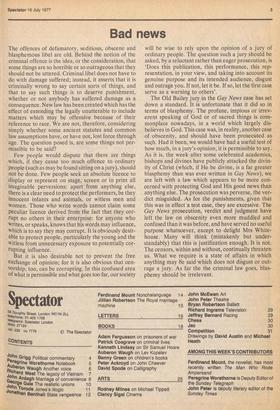Bad news
The offences of defamatory, seditious, obscene and blasphemous libel are old. Behind the notion of the criminal offence is the idea, or the consideration, that some things are so horrible or so outrageous that they should not be uttered. Criminal libel does not have to do with damage suffered; instead, it asserts that it is criminally wrong to say certain sorts of things, and that to say such things is to deserve punishment, whether or not anybody has suffered damage as a consequence. New law has been created which has the effect of extending the legally unutterable to include matters which may be offensive because of their reference to race. We are not, therefore, considering simply whether some ancient statutes and common law assumptions have, or have not, lost force through age. The question posed is, are some things not permissible to be said?
Few people would dispute that there are things which, if they cause too much offence to ordinary people (such as may be found sitting on a jury), should not be done. Few people seek an absolute licence to display or represent on stage, screen or in print all imaginable perversions: apart from anything else, there is a clear need to protect the performers, be they innocent infants and animals, or witless men and women. Those who write words cannot claim some Peculiar licence derived from the fact that they corrupt no others in their enterprise: for anyone who writes, or speaks, knows that his words may influence, Which is to say they may corrupt. It is obviously desirable to protect people, particularly the young and the Witless from unnecessary exposure to potentially corrupting influence.
But it is also desirable not to prevent the free exchange of opinion; for it is also obvious that censorship, too, can be corrupting. In this confused area of what is permissible and what goes too far, our society will be wise to rely upon the opinion of a jury of ordinary people. The question such a jury should be asked, by a reluctant rather than eager prosecution, is 'Does this publication, this performance, this representation, in your view, and taking into account its genuine purpose and its intended audience, disgust and outrage you. If not, let it be. If so, let the first case serve as a warning to others'.
The Old Bailey jury in the Gay News case has set down a standard. It is unfortunate that it did so in terms of blasphemy. The profane, impious or irreverent speaking of God or of sacred things is commonplace nowadays, in a world which largely disbelieves in God. This case was, in reality, another case of obscenity, and should have been prosecuted as such. Had it been, we would have had a useful test of how much, in a jury's opinion, it is permissible to say. As it is, the week after some celebrated academics, bishops and divines have publicly attacked the divinity of Christ (which, if He be divine, is a far greater blasphemy than was ever written in Gay News), we are left with a law which appears to be more concerned with protecting God and His good news than anything else. The prosecution was perverse, the verdict misguided. As for the punishments, given that this was in effect a test case, they are excessive. The Gay News prosecution, verdict and judgment have left the law on obscenity even more muddled and confused than it was before, and have served no useful purpose whatsoever, except to delight Mrs Whitehouse. Many will think (mistakenly but understandably) that this is justification enough. It is not. The censors, within and without, continually threaten us. What we require is a state of affairs in which anything may 15e said which does not disgust or outrage a jury. As far the the criminal law goes, blasphemy should be irrelevant.


































 Previous page
Previous page